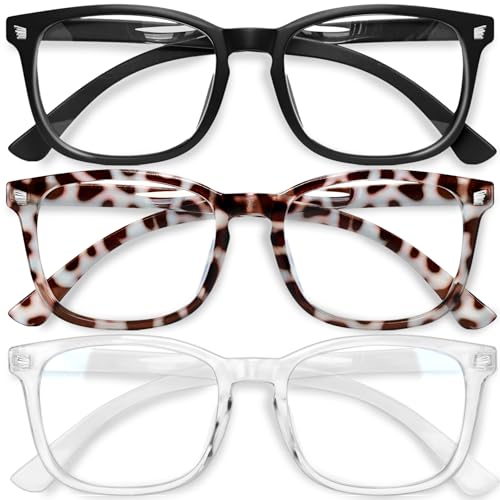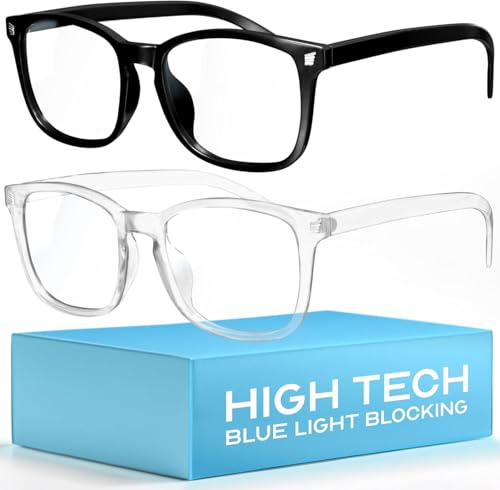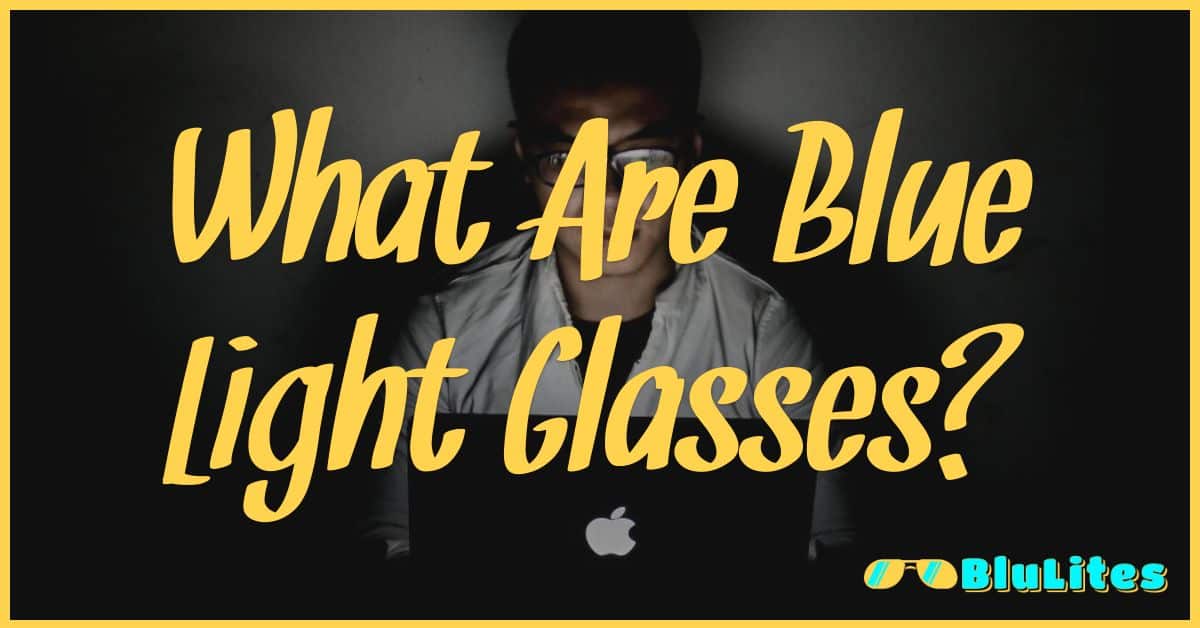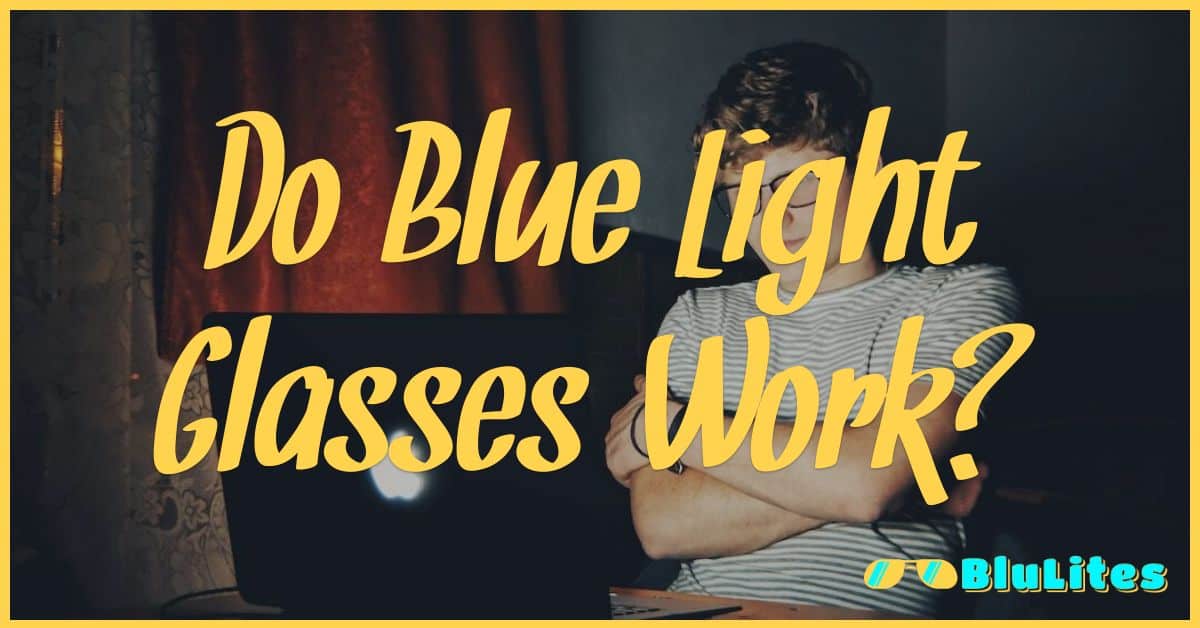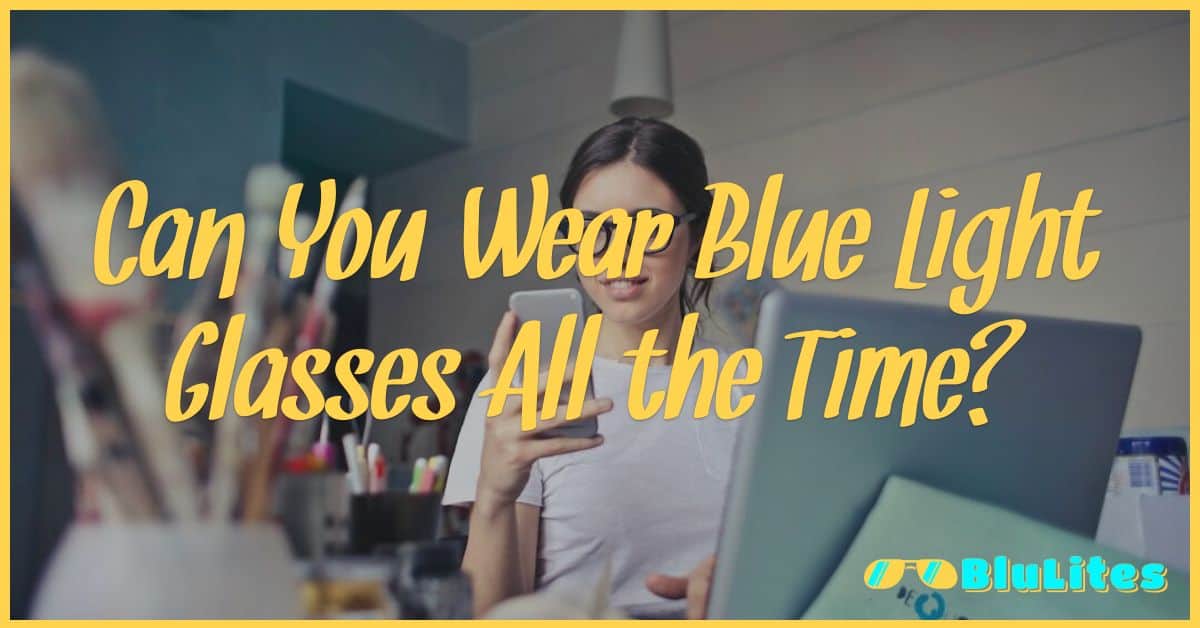In our tech-saturated world, it’s increasingly common to spend lengthy hours in front of screens, whether for work or leisure. By the end of the day, it’s not unusual for your eyes to feel tired, dry, and strained. You may be wondering, can blue light glasses provide some relief, especially under the harsh glare of fluorescent lights?
Let’s get straight to the point: Blue light glasses are designed to filter out the blue light emitted by screens, not fluorescent lights. But here’s the catch: since fluorescent lights also produce a small amount of blue light, these glasses may provide marginal benefit.
However, it’s important to remember that blue light glasses aren’t a magic solution to all eye strain problems. Optimal eye health goes beyond just wearing these glasses. It entails regular breaks, proper lighting, and routine eye check-ups. Stay tuned as we unpack the nuances of blue light and the role of blue light glasses.
Understanding Blue Light Glasses
Are your eyes feeling fatigued after staring at screens all day? Maybe you’re wondering about the reputed benefits of blue light glasses. Let’s dive headfirst into the world of these trendy lenses and see what they’re all about.

Blue light glasses have specially crafted lenses that are said to filter out or block blue light. Now, you might be asking, “What’s blue light?” Well, it’s a type of light with a short wavelength, which means it produces a high amount of energy. It’s everywhere around us, emitted by the sun, LED and fluorescent lights, and not forgetting – digital screens.
Theoretically, by reducing your exposure to blue light, these glasses could help minimize potential eye strain and discomfort. While this sounds promising, it’s important to note that * scientific evidence supporting their effectiveness is currently mixed*. The American Academy of Ophthalmology doesn’t endorse blue light glasses, as they argue the discomfort many people experience is stemmed more from how long they’re staring at screens, not the blue light itself.
It’s worth remembering that not all blue light is bad for you. Yes, while excessive exposure to blue light from artificial sources, like fluorescent lights and digital screens can strain your eyes, natural blue light exposure from the sun is beneficial. It can boost your alertness, elevate your mood, and even help regulate your sleep-wake cycle.
And how about fluorescent lights? Well, these do emit a notable amount of blue light. So if you’re frequently around such lighting, these glasses might offer some relief, albeit minor. To reduce the strain from fluorescent lights, other strategies can also be beneficial like adjusting the brightness, taking regular breaks, and maintaining a comfortable distance.
That’s the gist on blue light glasses! They’re a fascinating concept, but remember it’s best to consult your optometrist for personalized advice. They’ll help you decide if these glasses are a worthy investment for your eyes. After all, opportunity may knock, but you have to open the door!
Unpacking the Science: Blue Light Exposure
So, what’s the buzz with blue light, especially when it comes to fluorescent lights? You’re probably regularly hunched over your smartphone or locked onto your laptop, right? Maybe, you’re constantly basked in fluorescent office lighting? If so, it’s time to turn your attention to blue light exposure and how it impacts your peepers.
Fluorescent lights and digital screens emanate more blue light than any other artificial light sources. You might be thinking, “But isn’t blue light a natural part of the sunlight spectrum?” You’re spot on! However, it’s the overexposure to artificial blue light that’s raising eyebrows among scientists and health professionals.
Here’s a statistic for you. The American Optometric Association reports that the average American spends an astonishing seven hours a day staring at a screen. It’s not hard to see how blue light exposure quickly adds up, particularly if your workspace is also lit with fluorescent bulbs.
| Hours per Day | Source of Blue Light |
|---|---|
| 7 | Digital Screen |
The main cause for concern is the potential effects on your eyes and sleep cycle. That’s because blue light wavelengths stimulate the brain, reducing melatonin production. Melatonin is your body’s natural sleep hormone. When it’s suppressed, you might find it tough to switch off at night.
Beyond sleep issues, there’s the matter of digital eye strain. This is a syndrome comprising dry eyes, headaches, and blurred vision, among other symptoms. A Harvard study revealed that compared to other hue spectrums, blue light proved the most disruptive.
Following are the effects of blue light according to the American Optometric Association:
- Reduced melatonin production
- Potential sleep problems
- Digital eye strain
So, it’s clear that any tool to combat these effects is worthy of our attention. That brings us to blue light glasses, the shield claims to target these issues head-on.
Serious scientific research backing up the effectiveness of these glasses is scarce. Yet, many wearers advocate for their ability to minimize the symptoms linked to blue light overexposure.
The story of blue light and its effects on your health is an on-going saga. There’s no way to say definitively that these glasses are the complete answer. But they’re one tool at your disposal, and they’re well worth considering. Just remember—the best way to protect your eyes doesn’t lie exclusively in a piece of eyewear, but with regular eye breaks and limited screen time.
Curious and want to dig a little deeper? Don’t worry, we’ve got you covered with more info on blue light glasses and their claimed benefits in the sections to come. Hold onto your glasses – we’re just getting started!
Interplay Between Blue Light and Fluorescent Lights
When discussing the effects of fluorescent lights on your eyes, it’s crucial to understand the role of blue light. Fluorescent lights emit a substantial amount of this type of light, which is known for its short, high-energy wavelengths.
Blue light is everywhere.
In fact, the sun is the biggest source of blue light, and most artificial lights emit some level of it. Fluorescent lights, however, emit stronger amounts of blue light, which could potentially lead to eye strain or discomfort. Your eyes aren’t as efficient in blocking blue light, making it a significant concern when you’re exposed to fluorescent lighting for lengthy periods.
But here’s where blue light glasses come into play. These specialized glasses have lenses that block or filter out the blue light from digital screens and, you guessed it, fluorescent lights as well. They’re designed to minimize the amount of blue light that reaches your eyes, and therefore, help reduce potential discomfort or strain.
Blue light glasses are not a universal fix.
Despite the use of blue light glasses, it’s also important to adopt other aspects of proper eye care and workplace ergonomics. These could include adjusting screen brightness, taking frequent breaks, ensuring proper lighting, and exercising your eyes. Here are some measures you could consider:
- Adjust the brightness of your computer screen to a comfortable level.
- Follow the 20-20-20 rule. Every 20 minutes, look at something 20 feet away for at least 20 seconds.
- Ensure you work in a well-lit environment to reduce strain.
By understanding the interplay between blue light and fluorescent lights, you’re taking a significant step towards maintaining good eye health. While blue light glasses can help, achieving optimal eye health also requires a comprehensive approach to reduce unnecessary exposure to blue light, ensuring a perfect balance between work, rest, and your environment.
Examining the Impact of Fluorescent Lights on Your Eyes
Have you paused to consider how much time you spend under fluorescent lighting? Whether it’s at your workplace, in the local supermarket, or even at home, nearly everywhere you turn, you’ll find fluorescent lights illuminating your surroundings. Understanding the effect of these lights on your eyes is crucial for your overall eye health. You must be wondering, “Can fluorescent lights strain my eyes?” Let us delve into the matter.
As you might already know, fluorescent lights emit a type of blue light. This is not a concern during the daylight hours since your eyes are designed to handle sunlight, a much stronger source of blue light. It’s the extended exposure to artificial sources of blue light, typically after dusk, that raises eyebrows.
Here are a few points to consider:
- Fluorescent lights flicker. Although this flickering is often imperceptible to the naked eye, it does contribute to eye strain.
- These lights emit a substantial amount of artificial blue light, which does have the potential to contribute to digital eye strain and disrupt your sleep cycle.
- Exposure to the crisp, sharp contrast of the blue light emitted by fluorescent lights can cause your eyes to become fatigued.
You may have experienced symptoms such as redness, irritation, dryness, or even headaches if you’ve been under fluorescent lights for an extended period. These are all common signs of eye strain.
The use of blue light glasses comes highly recommended in this scenario. When used correctly, these glasses can help shield your eyes from potentially harmful blue light, reducing the risk of digital eye strain and its uncomfortable symptoms. Furthermore, these glasses can also aid in maintaining your sleep cycle, ensuring the synthetic blue light doesn’t fool your brain into thinking it’s daytime.
Addressing the influence of fluorescent lights on your eyes is not merely a matter of comfort; it is about safeguarding one of your most impressive assets – your vision. So, next time you switch on these lights, remember to protect your eyes, because they are, after all, the windows to your world.
How Do Blue Light Glasses Work?
Stepping into the technicalities, blue light glasses are specially designed glasses with lenses that either filter or block out a certain amount of blue light emitted from digital screens. It’s the blue light they’re designed to tackle. They have filters in their lenses that block or absorb blue light, hence decreasing the amount that gets through to reach your eyes.
There’s a common misconception that blue light glasses are similar to industrial strength eye protection used by professionals who work with blinding light. However, that’s far from the truth. Blue light glasses are typically engineered to filter out harmful blue light, not block it completely, which means your vision still retains the true colors of your environment.
The lens technology can vary among different manufacturers. Some introduce melanin to the lens material during the manufacturing process. Melanin is a natural pigment that protects our skin from sun damage and it’s also believed to shield from potentially harmful blue light.
There’s a lot of buzz surrounding the effectiveness of blue light glasses. A lot of this belief comes from an understanding of the human circadian rhythm. Research shows that exposure to blue light during the day helps maintain a healthful, natural sleep-wake cycle. However, too much exposure can disrupt this balance. Blue light glasses step in at this point, helping to effectively balance blue light exposure.
Do remember that, while many individuals swear by these spectacles, scientific research is ongoing. It’s important to remember that these glasses are not a one-size-fits-all solution for everyone’s visual comfort. Consult with an optometrist to determine the best course of action for your specific needs.
Use of blue light glasses:
- Can potentially reduce eye strain from long hours spent in front of screens
- May improve sleep quality by reducing exposure to blue light in the evening
- Can protect your eyes from the potential risks of overexposure to blue light.
You’ll find that these benefits make blue light glasses a practical tool in today’s digital age. However, their effectiveness may depend on individual factors like screen time and existing eye conditions.
Do Blue Light Glasses Help? Evidence-Based Findings
You’ve probably heard plenty of discussions about blue light glasses and their potential benefits. As fluorescent lights are known emitters of blue light, you might be wondering if your blue light glasses can provide some much-needed relief from these common light sources.
First, let’s get a handle on the basics. Fluorescent lights emit a significant amount of blue light, a range of the spectrum that’s believed to cause eye strain and disrupt sleep cycles. Blue light glasses are designed to filter out this type of light, potentially reducing related discomfort.
Scientific studies concerning blue light glasses and their effectiveness are still in progress, but preliminary findings suggest some relief for blue light-related problems. Notably, a 2017 study published in Ophthalmic and Physiological Optics reported reduced eye strain among computer users wearing the glasses.
| Study Published | Glasses Used | Outcome |
|---|---|---|
| 2017 | Blue Light Glasses | Reduced Eye Strain |
However, it’s important to acknowledge that individual results might vary substantially. Although some people report noticeable relief when wearing these glasses, others see little to no change. Factors like the length of exposure to blue light, individual sensitivity, and even the strength of the blue light being emitted by various devices or lights may all contribute to the results.
Here are some key aspects to consider when deciding if blue light glasses might be a useful addition to your routine:
- Personal sensitivity: Some people are more sensitive to blue light than others, and can experience anything from slight discomfort to significant eye strain.
- Exposure time: If you’re spending a lot of time under fluorescent lights or in front of screens, blue light glasses might offer some comfort.
- Quality of glasses: Not all blue light glasses are created equal. The quality of the glasses and the extent of blue light they filter can greatly affect how much they help.
Remember to have realistic expectations when it comes to blue light glasses. They may offer relief from discomfort caused by prolonged exposure to blue light, but they’re not a magic cure-all. Be sure to give your eyes regular breaks from screen time and consider other measures like adjusting screen brightness or altering room lighting.
Practical Pros and Cons of Wearing Blue Light Glasses
Time to explore the possible perks and drawbacks of donning blue light glasses. Is it myth or magic? Let’s dive deep into this intriguing topic.
One major perk of wearing blue light glasses? You’re giving your peepers extra protection. These glasses are designed to block the blue light that’s emitted not only from your digital screens but also from fluorescent lights. This means less exposure to potentially harmful blue light. Over time, you’ll find your eyes less strained, that’s because these glasses can reduce eye fatigue and discomfort. Remember those annoying headaches after a long workday glued to your computer? Well, they might become a thing of the past.
But let’s not stop there. Better sleep could be on the horizon for you. Research has shown that excess blue light, especially before bed, can disrupt your body’s natural sleep cycle. So, swapping out late-night screen time with pair of blue light glasses can foster more ZZZs.
Sounds pretty nifty, right? But hold your horses. It’s not all sunshine and rainbows.
While effective, these lenses aesthetic won’t appeal to everyone. Some find them a touch too yellow-tinted. What’s more, some claim a minor visual distortion effect as a downside. This can happen as your eyes adjust to the glasses.
Additionally, while they block most of the blue light emitted by devices and fluorescent lights, they don’t offer 100% protection. On average, they block about 20% to 40% of blue light from reaching your eyes.
And the knights in shining armor won’t come cheap. Depending on the brand and the quality, a pair of these glasses can put a dent in your pocket. However, it’s a small price for the benefits they bring.
Finally, more scientific studies are needed to back up some of the advertised benefits fully. While many users testify to their effectiveness, it’s important to remember that individual experiences can vary.
You’re now equipped with the knowledge to make an informed decision. Go ahead – take a step towards protecting your eyes from the onslaught of blue light. Good luck!
Comparisons: Blue Light Glasses Vs. Other Solutions
Searching for the perfect solution to combat harsh fluorescent lights? It’s likely you’ve come across blue light glasses. Let’s dig into how they match up against other solutions like anti-glare screens and lighting control solutions.
Blue light glasses are designed to filter out the harmful blue light emitted by screens and indoor light sources. They’re user-friendly and easily adaptable. All you need is to sport them like a regular pair of glasses and let the special lenses do their job.
Comparatively, anti-glare screens are used to minimize the glare from bright light sources. Though effective to some extent, they don’t filter out blue light specifically. This means that your eyes might still be subjected to the harsh effects of blue light. Moreover, it’s not always practical to use anti-glare screens, especially if you’re using different devices throughout the day.
Next, we have lighting control solutions like dimmers and light filters. They allow you to adjust the intensity and color temperature of the light source. Although versatile, these methods might fail to fully tackle the problem of blue light alone.
Here’s a simple comparison of these options:
| Blue Light Glasses | Anti-glare Screens | Lighting Control Solutions | |
|---|---|---|---|
| Filters Blue Light | Yes | No | No |
| Versatility | Wearable Everywhere | Device Specific | Area Specific |
| User Friendly | Yes | Yes | Could be Complicated |
Evaluating this brief comparison, blue light glasses certainly stand out as a strikingly practical and efficient solution to mitigate the effects of prolonged exposure to fluorescent light and other harsh light sources. As with all things, what works best is typically subjective and dictated by personal preference and lifestyle. It’s often beneficial to consult with an eye care professional to discuss which solution is right for you.
What Experts Say About Blue Light Glasses and Fluorescent Lights
Unsurprisingly, controversy surrounds the concept of blue light glasses benefitting those in fluorescent light environments. Not all perspectives align, but it’s still valuable to delve into various expert opinions. Here’s the lowdown:
A crucial point to consider is the level of exposure. Remember, short-term exposure to blue light won’t cause eye damage. But, daylight hours spent under fluorescents in your workplace? That’s possibly a different story.
Optometrists like Dr. Rishi Singh highlight that fluorescent lights emit a significant amount of blue light. When exposure is intensified and prolonged, you could experience what they term ‘digital eye strain’. Sounds uncomfortable, right? Blue light glasses come into play here, potentially reducing your discomfort.
Table 1: Usual Symptoms of Digital Eye Strain
| Symptoms |
|---|
| eyes feeling heavy or fatigued |
| blurry vision |
| headaches |
| problems focusing |
Experts like Harvard Medical School researchers also chip in with concerning findings. They argue that exposure to excessive blue light before bedtime can impede your sleep. It’s all about your body’s internal clock, or ‘circadian rhythm’. A pair of blue light glasses might help you secure that all-important beauty sleep.
However, on the other side of the fence, experts such as those from the American Academy of Ophthalmology firmly state that they don’t recommend any special eyewear for computer use. They feel it’s enough to adjust your workstation and take regular breaks.
In a nutshell, expert views on blue light glasses and fluorescent lights tend to differ significantly. They all have impressive credentials and solid logic behind their claims. You’re in the driver’s seat with this decision, armed now with new knowledge to steer your course.
Concluding Thoughts: Are Blue Light Glasses Worth It?
Reaching the end of our exploration, we’re now positioned to answer the all-important question: Are blue light glasses worth your investment?
Firstly, it’s crucial to understand that the effectiveness of blue light glasses can vary from person to person. While some individuals may find great relief, others might notice little to no change.
Let’s revisit important data we’ve covered:
| Benefit | General Consensus |
|---|---|
| Eye fatigue relief | Most users testify to experiencing less eye fatigue, particularly those working with screens extensively. |
| Sleep Quality | Scientific research supports that reduced evening exposure to blue light aids in good sleep. |
| Vision Protection | Though more studies are needed, there’s a growing belief that blue light glasses can help prevent future vision issues. |
To summarize, here are the key takeaways:
- Blue light glasses can minimize the effects of extended exposure to harsh artificial light sources like fluorescent lights.
- They may enhance your comfort, particularly if your daily routine involves prolonged screen time.
- Evidence indicates they could improve sleep quality by limiting late-night blue light exposure.
- Plenty of users report reductions in headaches and eye strain.
However, their effectiveness isn’t guaranteed for every user. It’s not a miracle cure for serious eye conditions. If you’re experiencing serious vision issues or discomfort, it’s advisable to consult an eye health professional.
In conclusion, there’s no denying that blue light glasses could be a valuable tool for dealing with the modern world’s demands. But remember, their success hinges on your personal needs and circumstances. You’ll likely have to try them out to figure out if they’re a good fit for you. Ultimately, anything that promotes better screen habits, eye comfort, and sleep quality is worth considering!







